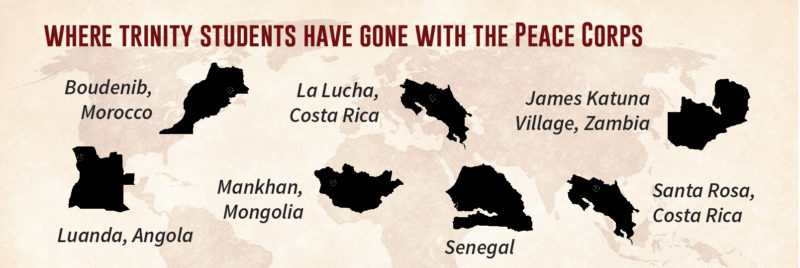A representative from the Peace Corps visited campus on Wednesday, Sept. 27, to host an information session for prospective Peace Corps volunteers at Trinity.
“The mission of the Peace Corps is to promote global peace and friendship,” said Brendan Cavanagh, the Peace Corps representative who presented to about 10 students that day. A former Peace Corps volunteer himself, Cavanagh served the Ivory Coast for three years.
Peace Corps volunteers serve with three goals in mind, all of which are tied to the mission of global peace and friendship: to bring technical assistance to the community being served, to give the community a better understanding of Americans and, upon completion of the service, to give the U.S. a better understanding of the community and country where the volunteer served.
After making it through a highly competitive selection process, Peace Corps volunteers serve for two years in their assigned country. The first three months of this time is devoted to pre-service training.
“We’re not just going to throw you out there and expect you to know how to get by in a foreign country. You spend your first three months learning the local language. Maybe you already speak Spanish or French “” you’re going to certainly become fluent, and probably learn a local language as well. You’re going to learn about the culture so that you know how to carry yourself and be comfortable in that community without standing out or offending anyone,” Cavanagh said.
Once the training is complete, volunteers are sent to their respective communities, where they begin fulfilling the first of the Peace Corps’ three main goals: bringing technical assistance to the community.
Cavanagh shared low and high points of his two-year experience bringing reliable potable water to the village he served in.
“It was difficult to adjust to living without water and electricity, and getting used to a different lifestyle. For the first month, I questioned whether or not I should stay. You don’t show up with a job description that says, “˜Do this and do that.’ You have to really figure it out,” Cavanagh said. “After the first month, I got some projects started and got more comfortable in the community. That turned out to be the most rewarding part, that I was able to live there after doubting that I was going to be able to, knowing that there’s a lot I can do if I decide to.”
Peace Corps volunteers are paid a stipend equivalent to a local salary, given vacation time and offered free medical care at Peace Corps offices, which are located in every country with a Peace Corps presence.
Additionally and upon completion of their service, Peace Corps volunteers are placed on the short list for most jobs in the federal government, enjoy an extensive network of other former volunteers and are eligible for large scholarships towards graduate studies at an extensive number of universities.
The network of former volunteers includes a large number of Trinity alumni. A Peace Corps spokesperson told the Trinitonian that 172 Tigers have served since the organization’s founding in 1961.
One of these Tigers is David Young, class of 2006, who served in Boudenib, Morocco. Young was featured in the summer 2016 edition of Trinity Magazine.
“”˜People in the Peace Corps have to be very creative, because you are never sure of what is going to happen. In this tiny desert town, I drew on the firm foundation Trinity gave me as an independent researcher and I figured out solutions to some hard, abstract problems,” Young said in an interview with Trinity Magazine.
In addition to applying prior knowledge to improve lives, Peace Corps volunteers gain valuable experience over the course of their service.
“You learn skills like leadership and resourcefulness and teambuilding, which are applicable and valuable to any career that you go into. Peace Corps is something really unique that will stand out on a resume,” Cavanagh said.
Gaby McKay, who graduated with a degree in communication and Spanish in 2013 and a Master of Arts in Teaching in 2016, served in La Lucha, Costa Rica, and invites everyone to look into Peace Corps service.
“I would encourage anybody to join the Peace Corps because you learn about different cultures in a more in-depth way than study abroad or even an extended vacation. I lived and worked in a community where people had an open door for me at all times,” McKay said in an interview with Trinity Magazine.
The Peace Corps accepts applications throughout the year for a variety of positions in over 60 countries. More information can be found at peacecorps.gov/apply, or by emailing Brendan Cavanagh at [email protected].







